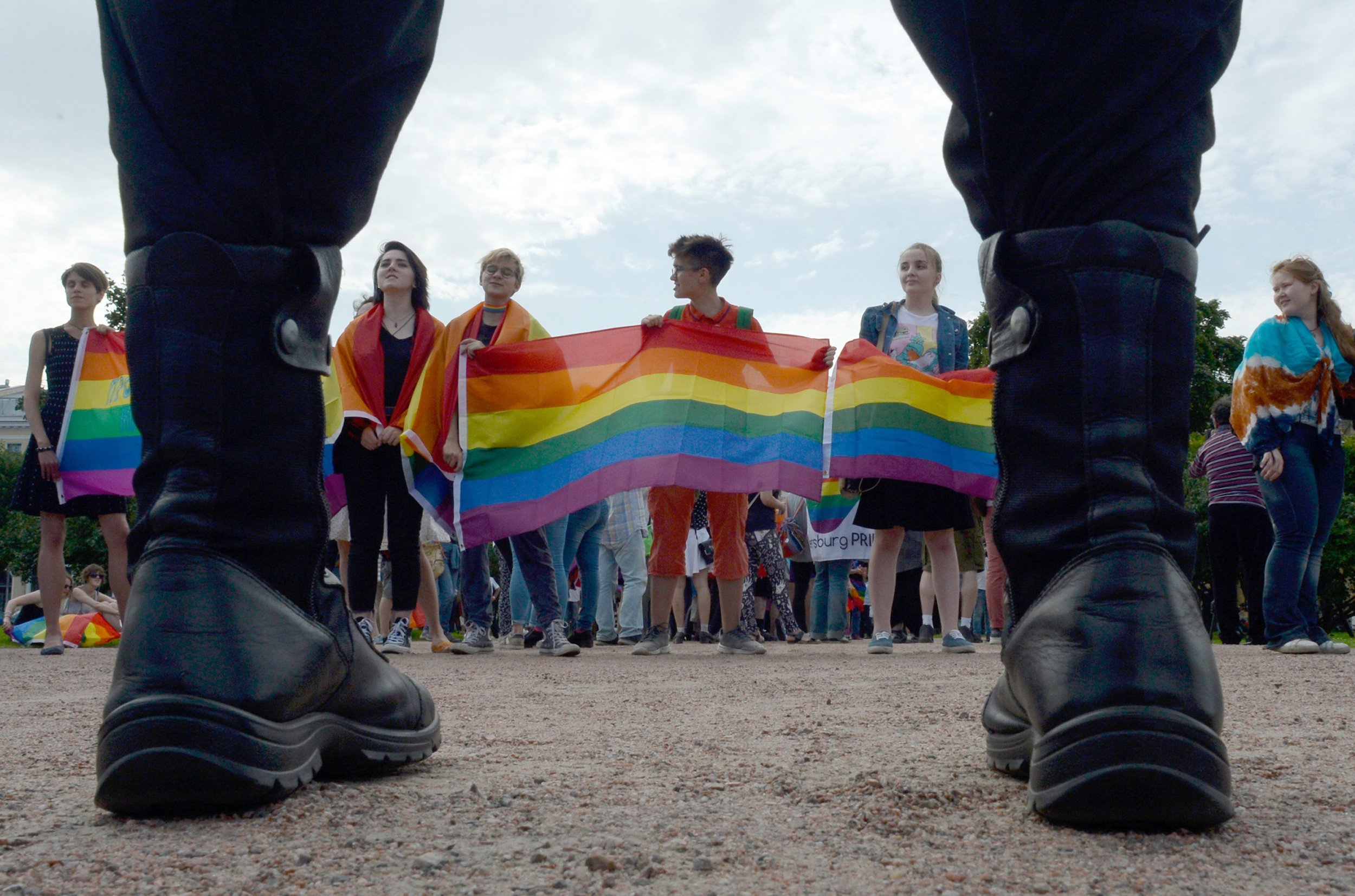
Russian activists announced the first government-permitted Gay Pride march, but less than 24-hours later, local officials said they would not let the event go ahead, even in a town with a population of only seven people.
The initial announcement, made by one of the country's most famous LGBT rights activists, followed a series of bids from campaigners to hold a Pride event in Russia, this year.
In response to an application for holding a Pride event in the city of Novoulyanovsk, the founder of Gay Russia, Nikolai Alekseev, said he received a letter instructing him the event could take place if he moved it outside the city. The stated reason for the move was that the route "passes through the central part of the city of Novoulyanovsk… which is visited by a large number of citizens, including minors," according to the letter Alekseev posted on his social media account.
"The bravest person in Russia is the head of Novoulyanovsk's city administration," Alekseev wrote in his post. "She allowed us to conduct a gay parade in the village of Yabloneviy, whose population consists of… seven (!!!) people. There was also the option of suggesting the village of Panskaya Sloboda with a population of 131 people, as the location for a gay parade, but this was a tad too progressive for modern Russia."
Alekseev said that Novoulyanovsk city administration head Svetlana Kosarinova joins the ranks of other "bravehearts" alongside the local administration of Yoshkar-Ola, who appeared to greenlight an LGBT event in the city outskirts in 2016, before announcing that activists provided too little information and pulled the plug on the event. "Thank you Svetlana Anatolyevna, you are a true liberal, democrat and all-round human."
The unglamorous setting is over 500 miles east of Moscow but despite the distance and the fact that Russia's 2010 census has its population listed as a mere seven people, by far the smallest of the settlements outside Novoulyanovsk, Alekseev did not appear phased by indignation on Thursday. In another post on his VKontakte social media page he confirmed that he had sent a letter, accepting the slot.
"In this way, the first-ever approved gay parade in Russia should go ahead on 26 of August 2018 between 12am and 14pm in the village of Yabloneviy," Alekseev said, urging people to attend. "The main thing is not to exceed the stated number of participants. We declared 300 people. We will begin assembling a list of participants. It will be the coolest event in Russia's history."
Less than a day since Alekseev's announcement, Novoulyanovsk local authorities appear to already be distancing themselves from the decision, as a city official speaking on the condition of anonymity on Thursday morning said that the municipal chief Gennady Denikayev was ready to pull the plug on the event, despite the letter in Alekseev's posession that gave reason to believe the event was taking place.
"Not anymore," the official told the Govorit Moskva (Moscow Speaks) radio station. "The head of the city here was not in the loop about this event and that is why he has banned it."
Read More: Russia must defend the internet from "same-sex values" and pedofiles, says Lavrov
"I have made the decision that there will be no gay parade on the territory of the Novoulyanovsk municipality," Denukayev is quoted as saying by local news outlet Ulnovosti. "We intend to defend traditional family values and... our children from the propaganda of nontraditional sexual relations among minors."
In recent years, the Kremlin has introduced harsher rules and punishments for public assembly and outlawed many demonstrations of non-heterosexual relationships, on the spurious grounds that it can be harmful to children.
A law on LGBT+ visibility in 2013 has allowed conservative Russian authorities to shut down a wide range of public activities, ranging from educational to recreational. The law, which equates many displays and symbols of non-heterosexual identity as adult content, has resulted in the closure of LGBT websites and provided some groups a "license to harm" LGBT people with impunity, Human Rights Watch has said.
Alekseev has repeatedly tried to conduct a Pride march in Moscow since the mid-2000s, with the event consistently being plagued by violent interruption or refusal of official backing. He launched a court case for the right to hold such an event in the capital over the next century in 2012, losing the ruling.
As part of his activism, Alekseev has tried booking areas outside the capital for a Pride march and announced in the aftermath of Thursday's decision that he has already submitted a request for a march in five cities in Saratov region.
The activitst stood by the initial permission granted to him, arguing that he would personally defend Kosarinova in court, if she is reprimanded by administration superiors. "The situation in Novoulyanovsk is testament of the fact that even a high-ranking official in Russian government is incapable of making a decision on the basis of jurisprudence and their conscience. They are simply not permitted."
Uncommon Knowledge
Newsweek is committed to challenging conventional wisdom and finding connections in the search for common ground.
Newsweek is committed to challenging conventional wisdom and finding connections in the search for common ground.
About the writer
I am a Staff Writer for Newsweek's international desk. I report on current events in Russia, the former Soviet Union ... Read more
To read how Newsweek uses AI as a newsroom tool, Click here.








